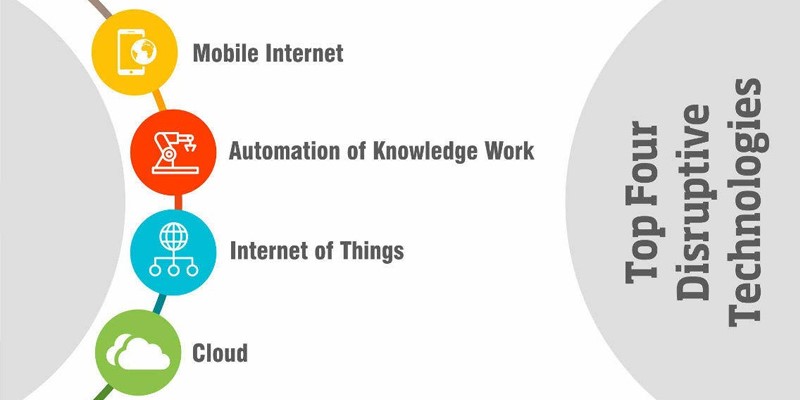Clayton M. Christensen, a Harvard Business School professor, defines disruptive technologies as a new emerging technology which has the ability to unexpectedly move an established one. He used this term for the first time in his 1997 best-seller, “The Innovator’s Dilemma.”
The book reads about two categories of new-age technologies, one is sustaining and the other is disruptive. Sustaining technologies are ones which are well-known and have undergone continuous improvements. On the other hand, Disruptive technologies are referred to the ones which are still getting better, face performance issues, known to lesser people and also which might not even have a practical application as of today. Disruption can be perceived in different ways. Let’s take the literal meaning of the word disruptive which means to alter or destroy the structure of society. Similarly, disruptive technologies have the ability to alter the way we live, the manner we work in and the overall business and global economy. Now the question arises that what technologies are these? And what benefits would they bring to the world we live in?
The McKinsey Global Institute has published a report which says that there are twelve technologies which have the abilities to create great disruption in the coming years as they would affect the economy and our lives. This report laid down by the McKinsey Global Institute also provides quantitative data on how these technologies can alter the economy, and what are the risks involved. Believe it or not, the concepts behind these technologies have prevailed for a very long time. In this post, we talk about the top four of these twelve disruptive technologies.

Mobile Internet
Cost effective and capable mobile computing devices and internet connectivity, which are gaining popularity by the day, have proved to be beneficial in a lot of areas. One such aspect is treating chronic diseases through remote health monitoring. The other example is of the mobile banking platforms which have been seen to bring about radical changes in Uganda and other African countries.
Automation of Knowledge Work
In future, we will have more intelligent software systems that can perform knowledge work tasks. Eric Shmidt, the executive chairman of Google says that the major changes which will be brought by such intelligent software systems will be in form of how we connect with computer, thus looking at the brighter side of things.
Internet of Things
The Internet of Things or IoT as it is fondly called is term laid down by Kevin Ashton in 2009. This defines an internet scenario where machines will communicate with other machines. Embedding sensors in all the objects across the globe would allow these machine-readable identifiers to change our lives as we know them. The idea talks about the formation of an interconnected network which would include cost-effective sensors and actuators which collect data, monitor the actions, make decisions and optimize the process. Devices like these find usage in areas like manufacturing, health care and mining. With every technology, there are certain risks involved – with IoT having billions of smart devices connected to each other there is a very high-security threat.
Cloud
Cloud computing uses a combination of hardware and software resources to deliver services over the internet or a network. We all are aware of its existence and should understand that this is developing at very high speeds.
These are the top four disruptive technologies according to me which have the potential to change the world of business and our lives tremendously. At Cognixia we provide great training programs on emerging technologies and prepare you for the future. For further information, you can write to us

